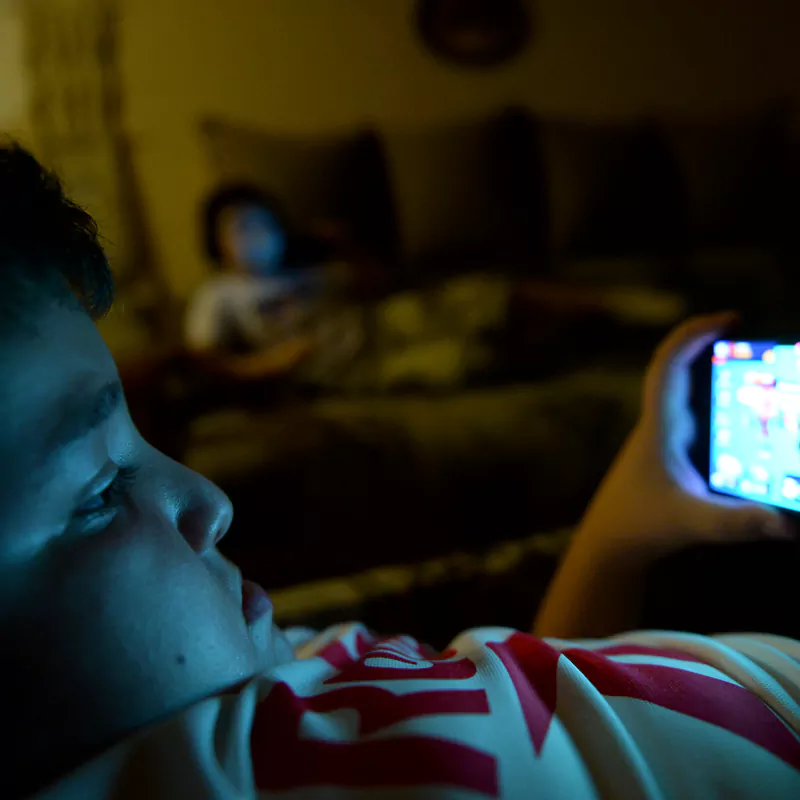Too Much Screen Time = Instant Gratification = Eventual Regret
Ask yourself, is there something else you should be doing right now? Like completing the project you had put on the back burner, but is now wanted urgently. Or the whitepaper that requires you to focus and do some research to get it out of the way. You even tend to forget about that load of laundry sitting in the washing machine waiting to be taken out and hung out to dry!
If any of these scenarios resonate with you, rest assured, you’re not alone. The primary reason why we find it challenging to stay on track with our daily tasks and long-term projects, despite being fully aware of their greater benefits compared to immediate indulgences, lies in the lure of instant gratification effects on society.
We are wired to seek immediate rewards and pleasures. Whether it’s scrolling through social media, watching entertaining videos, or engaging in other enjoyable diversions, these activities provide quick rush of happiness. Unfortunately, screen time and instant gratification is fleeting and don’t contribute to our long-term growth or success.
This tendency is deeply rooted in human psychology, and it affects all of us to some extent. Procrastination is a familiar foe that we confront on a daily basis, and our ability to resist it varies from person to person.
To overcome this natural inclination for instant gratification and achieve our daily and long-term objectives, it’s crucial to develop self-discipline, time management skills, and a strong sense of purpose. By understanding our psychological tendencies and consciously working to prioritize goals, we can try and strike a balance between short-term indulgence and long-term achievement.
Thinking of breaking tasks into smaller, manageable chunks, rewarding ourselves for progress, and creating a structured environment that minimizes distractions can all be helpful strategies to stay focused and committed to our long-term pursuits.
Remember, the journey to success may have its challenges, but embracing delayed gratification and maintaining focus on our goals will ultimately lead us to more meaningful and fulfilling lives.
10 insights into instant gratification
- The desire to avoid delayed gratification is natural as self-denial is uncomfortable, and our instincts push us to seek pleasure whenever possible.
- We are born with great certainty and trust in others, but as we grow older, we become less sure about the reliability of others and our future. This uncertainty can lead us to prioritize immediate rewards over more beneficial but uncertain long-term outcomes.
- Age plays a role in our ability to delay gratification. Younger individuals tend to be more impulsive, while older people with more life experience are better at controlling and delaying their urges.
- Choosing delayed gratification requires the ability to envision the future without giving in to current desires. If we cannot vividly picture our desired future, we lack the motivation to plan for it.
- Higher intelligence is linked to a more forward-thinking perspective, making those with greater innate intelligence more inclined to value delayed gratification.
- Poverty can complicate and make the decision to delay gratification even more difficult, especially when immediate basic needs like food and shelter must be met.
- Impulsiveness is a trait that makes delaying gratification more challenging and is associated with issues like substance abuse and obesity.
- Individual differences in emotion regulation also influence our inclination towards instant or delayed gratification. Emotional distress tends to push us towards choices that offer immediate mood improvement.
- Our current mood can also sway us towards immediate gratification. Bad moods, boredom, and impatience make immediate desires more tempting.
- Our experience of anticipation can affect our decisions regarding delayed or immediate gratification. Positive anticipation may lead to putting things off, while negative anticipation may drive us to seek immediate pleasure or avoid discomfort.
Impact of excessive screen time on children

The impact of instant screen time gratification on children has been a subject of increasing concern in recent years due to the widespread use of digital devices and technology. A major impact of easy and constant access to instant gratification through screens is the shortened attention span in children.
When your child gets used to receiving immediate responses and quick fixes from digital devices, it can make it more challenging for her to focus on tasks that require sustained attention and effort.
Another negative effect of spending too much time in front of screens is lopsided and dysfunctional social skills development. Excessive screen time activity interferes with essential social skills in children as it limits real-time, face-to-face interactions with others.
This affects a child’s ability to interpret nonverbal cues and leads to difficulties in establishing meaningful relationships.
Studies suggest that excessive screen time, particularly in very young children, impacts cognitive development and language skills negatively. A child’s brain needs diverse real-world experiences to develop properly, and excessive screen time might limit those opportunities.
Another fact often overlooked is instant gratification from screens influences a child’s emotional well-being. If your child becomes used to getting her desires fulfilled immediately on screens, it can lead to impatience and frustration in situations where instant gratification is not possible.
Prolonged screen time will have a negative impact on physical health, as it will contribute to a sedentary lifestyle, leading to obesity and posture problems. Children who spend excessive time on screens are likely to engage in less physical activity and outdoor play.
The use of electronic devices such as smartphones, tablets, computers, and televisions before bedtime negatively impacts sleep quality and disrupts the body’s natural sleep-wake cycle. Electronic screens emit blue light, which can suppress the production of melatonin, the hormone responsible for regulating sleep-wake cycles.
Engaging in stimulating activities on screens, such as video games or watching exciting content, keeps the brain alert and active leading to increased mental arousal, stress, and anxiety, making it difficult for the mind to disengage and relax. This will make it harder for your child to fall asleep, as well as reduce the overall quality of her sleep.
Hence, putting in place a relaxing bedtime routine that doesn’t involve screens is a great idea. This would include reading a book, practising relaxation exercises, or listening to calming music. Make it a point to keep electronic devices out of the bedroom to minimize the temptation to use them before sleep. And most important, encourage your child to engage in physical activity during the day as it will promote better sleep at night.
Technology is a valuable educational tool when used in moderation, as excessive screen time will displace time spent on other essential learning activities. It is crucial for parents to strike a balance and set appropriate limits on screen time.
Encouraging a mix of activities, including outdoor play, participation in creative endeavours and face-to-face interactions, can go a long way in supporting the healthy development of your child.
Resolving the “screen time” dilemma

Resisting the temptation of instant gratification when it comes to screen time is challenging, to say the least. To overcome this habit, it is crucial to recognize the impact instant gratification has on our decision-making process.
More importantly, children need to work on developing self-awareness about their tendencies to postpone and give in to the allure of short-term rewards. This approach can help us build strategies to combat and correct an all-pervasive negative behaviour.
The flip side of instant gratification is delayed gratification, or the decision to put off satisfying our desire in order to gain an even better reward or benefit in the future. But we, along with our children, still struggle on a daily basis with the temptation to give in to our immediate desires.
This is why taking an effective and functional approach helps us learn to set goals and practice delayed gratification when it comes to limiting screen time. It not only fosters a mindful approach but also assists us to regain control over screen usage and stay focused on more meaningful activities.
Instant gratification tips to resist temptation

Here are some practical tips to help resist the lure of instant gratification and reduce excessive screen time.
Set clear goals: Start by defining long-term objectives and priorities. Establish specific goals such as finishing a project, pursuing a hobby, or spending quality time with family. Having a clear sense of purpose will make it easier to resist the distractions of instant gratification through screens.
Limit access: Set boundaries on when and where you use screens. Create designated “screen-free” zones or times, such as during meals, before bedtime, or in certain rooms. By establishing these limits, you’ll reduce the impulse to constantly check your phone or use other devices.
Disable notifications: These can be highly distracting and prompt you or your child to check the mobile phone unnecessarily. Use a “Do Not Disturb” mode during focused work or quality time with others to minimize interruptions.
Develop a structured daily routine: Make sure that you allocate specific time for screen-related activities. This can include work or study hours, entertainment time, physical activity and relaxation periods. Stick to a schedule to maintain a healthy balance between screen use and other essential aspects of life.
Help your child be aware: Teach her to practise mindfulness, and be aware of her screen habits and the triggers that lead to excessive usage. Whenever she feels the urge to mindlessly browse, tell her to pause and reflect on her priorities. Mindfulness will help your child regain control over her actions and make intentional choices rather than give in to an impulsive habit.
Discover alternative activities: Engage in hobbies, reading, or spending time in nature. Do things together that bring joy and fulfilment outside of screens. By exploring different interests, your child will learn to find healthier ways to experience gratification without resorting to screens.
Use apps and tools: Consider using apps or features that help manage screen time. Some devices have built-in screen time tracking and app usage limit features. Or you can install third-party apps designed to reduce distractions and monitor usage.
Award stars: Celebrate successes when your child limits screen time and stays focused on her goals. Award stars when she achieves pre-specified milestones. Positive recognition will reinforce your child’s commitment to reducing screen time.
It pays to be patient: Changing habits takes time and effort, so be patient with your child. It’s normal to experience occasional setbacks. If you find her slipping back into old habits, don’t be too hard on her. Acknowledge the slip, learn from it, and get her to recommit to her goals.
Overcome instant gratification bias

Undoubtedly, resolving any kind of bias is a challenging task, more so when it is a child you are trying to help overcome screen time addiction. Just like resisting other forms of instant gratification, reducing excessive screen time requires conscious effort and self-discipline. If it were an effortless endeavour, we would all be seeing many people leading healthier, more balanced lives with a stronger financial foundation.
The pervasive nature of screens and the instant access to entertainment, information, and social connections the digital age provides, puts immediate gratification at our fingertips. However, excessive screen time has been linked to a range of negative effects on physical and mental health, including sedentary behaviour, disrupted sleep patterns, eye strain, increased anxiety, and reduced focus and productivity.
Similar to the challenge of resisting unhealthy food when trying to maintain a balanced diet, we must actively empathize with our future selves. By visualizing the impact of excessive screen time on our physical and mental well-being, we can make more informed choices about how much time we spend in front of the screen.
However, it’s crucial to understand that not all screen time is bad. While excessive time spent on mindless scrolling or entertainment might be detrimental, there are valuable and productive uses of screen time, such as educational purposes, professional development, and meaningful social interaction. Stick with these.
By striking the right balance, we will not only improve our physical and mental health but also enable everyone in the family to reclaim time for other fulfilling activities, ultimately leading to a more enriching and satisfying life.
About My Gym
One effective way to help young children disengage from spending too much of their time in front of screens is by involving them in physical activities that are as inspiring and exciting as what they experience sitting in front of screens.
My Gym promotes all-around development through dynamic games and physical movement that help augment the growth of neural networks in the brain. This helps children acquire critical social and intellectual skills and enable them to navigate complex social situations and nurture emotional development in a healthier way.
My Gym also runs enrichment programs that lay a firm foundation for personal, academic and future growth by involving children in age-appropriate, structured and unstructured play designed to develop thinking and problem-solving skills.
Please visit any of My Gym centres to learn more about how it can support “whole-child development”. Choose a day when you are relatively free and come over with your child in tow. Your child could be an infant (as young as 6 months), a toddler or a preschooler, age is not a bar to learn how your child can get away from the screens without missing out on anything!
Please note: My Gym classrooms are thoroughly sanitized every day — the tables, the chairs, the children’s activity stations and everything else the child might touch is made safe and clean. Whenever required, children are encouraged to wear a mask, wash their hands frequently, and practice social distancing as well.



